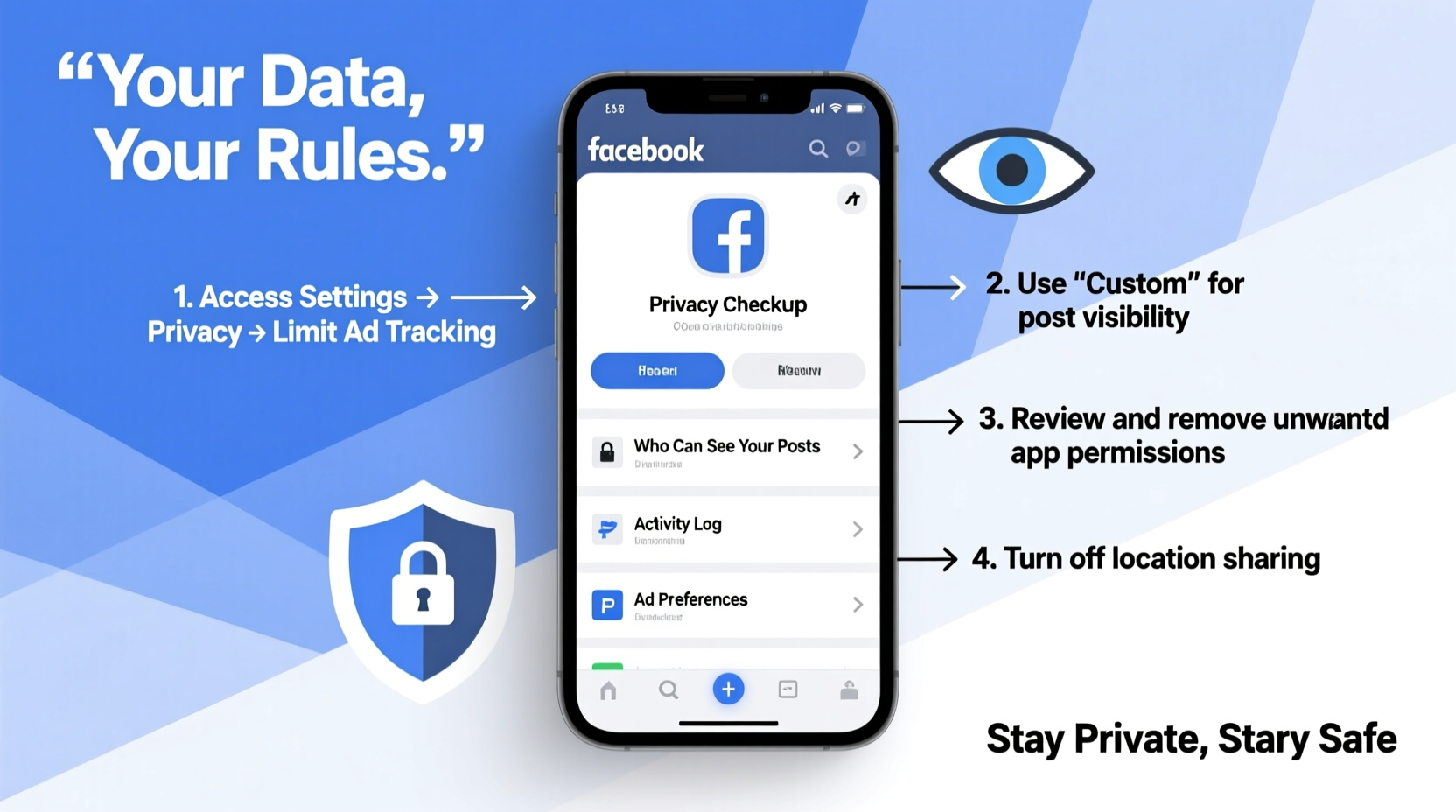In an era where personal data is constantly at risk, social media platforms like Facebook require careful management. With over 2.9 billion monthly active users, Facebook remains one of the most valuable targets for data harvesters, scammers, and advertisers. While Facebook offers robust privacy tools, they are often buried under layers of menus or set to public by default. Taking control of your digital footprint isn’t just advisable—it’s essential. This guide walks you through every critical setting, feature, and habit needed to lock down your account, protect your information, and maintain full autonomy over who sees what.
1. Start with Your Account Settings

The foundation of Facebook privacy begins in the Settings & Privacy menu. Access it by clicking the downward arrow in the top-right corner of any Facebook page, then selecting “Settings & Privacy” > “Settings.” Here, you’ll find multiple tabs—each governing a different aspect of your experience.
Begin with the **Privacy** tab. This is where you control who can see your future posts, who can look you up, and how your information is shared across the web.
- Who can see your future posts? Change this from “Friends” or “Public” to “Only Me” if maximum privacy is your goal. You can always customize individual posts later.
- Limit past posts: Click “Limit the audience for posts you’ve shared with friends or Public.” This instantly changes all previous public or friends-of-friends posts to “Friends only.” It won’t affect tagged content or posts others have shared about you, but it’s a powerful reset.
- Who can send you friend requests? Restrict this to “Friends of Friends” to reduce spam and fake accounts.
2. Lock Down Profile Information and Tags
Your profile contains sensitive details—your workplace, education, location, relationship status, and more. Each piece increases your digital exposure. Navigate to the **Profile and Tagging** section in Settings to tighten these controls.
- Under “Who can post on your profile?” select “Only Me” to prevent strangers from commenting publicly.
- Set “Who can tag you in posts?” to “Friends” or even “Only Me” to stop unwanted tagging.
- Enable “Review tags people add to your posts before they appear on Facebook.” This gives you final approval over any mention or photo tag involving you.
- Turn off “Timeline review” if not already enabled—this allows you to approve posts you're tagged in before they appear on your timeline.
Next, go to your actual profile and click “About.” Review each category: Work, Education, Places Lived, Contact Info, etc. For each field, hover and click the audience selector (globe/friends/lock icon). Set sensitive entries to “Only Me” or remove them entirely if unnecessary.
Real Example: The Overshared Commute
Jamal, a marketing professional, once posted a photo of his morning coffee with a geotag near his home. Over time, he regularly checked in at his gym, office, and favorite café. A former acquaintance used this pattern to predict his routine and attempted a home break-in while Jamal was at work. After tightening his location sharing and removing check-ins, he regained control—and peace of mind.
3. Control App and Website Integrations
Facebook Login is convenient—but dangerous when misused. Third-party apps that use “Log in with Facebook” gain access to varying levels of your data, including email, friends list, birthday, and sometimes even private messages.
To audit connected apps:
- Go to Settings → Apps and Websites.
- Review the list. Remove any unfamiliar or unused services.
- Click “Edit” next to each app to see exactly what data it accesses. Revoke permissions like “Posts,” “Photos,” or “Friends List” unless absolutely necessary.
- Toggle off “Instant Personalization” to stop sites like Spotify or TripAdvisor from automatically pulling your info when logged into Facebook.
| Permission Type | Risk Level | Action |
|---|---|---|
| Email Address | Medium | Acceptable for trusted apps; otherwise limit |
| Friends List | High | Revoke unless essential (e.g., multiplayer games) |
| Publish Posts | Critical | Remove immediately unless actively used |
| User Birthday | Low-Medium | Generally safe, but avoid for minors |
“Most data breaches don’t come from hacking—they come from oversharing through third-party apps. Always assume anything linked to Facebook can be exploited.” — Lena Torres, Cybersecurity Analyst at Digital Shield Labs
4. Manage Location, Camera, and Device Access
Mobile apps track aggressively. Even if you don’t check in, Facebook may collect background location data. To stop this:
- On iOS: Go to Settings → Privacy → Location Services → Facebook → Select “Never.”
- On Android: Settings → Apps → Facebook → Permissions → Location → Deny.
Within Facebook itself, disable location tagging:
- Open Settings → Location.
- Turn off “Location History.”
- Uncheck “Include location when posting.”
Also consider disabling camera and microphone access unless actively posting photos or videos. These permissions can be toggled off in your phone’s app settings.
5. Complete Privacy Checklist
Use this checklist as a final audit to ensure no setting is overlooked:
- ✅ Set future post visibility to “Only Me” or “Friends”
- ✅ Limit past posts to “Friends only”
- ✅ Review and restrict profile info (About section)
- ✅ Enable tag review and timeline approval
- ✅ Remove or restrict third-party app access
- ✅ Disable location tracking on device and in app
- ✅ Turn off facial recognition (Settings → Face Recognition → “No”)
- ✅ Log out of unused devices (Settings → Security and Login → Where You’re Logged In)
- ✅ Enable two-factor authentication for account security
- ✅ Disable ad personalization (Ad Preferences → Ad Topics → Opt Out)
Frequently Asked Questions
Can Facebook still track me if I make everything private?
Yes, to some extent. While privacy settings control who sees your content, Facebook still collects behavioral data (likes, clicks, time spent) for internal analytics and ads. To minimize tracking, use browser extensions like uBlock Origin or Privacy Badger, and avoid logging into Facebook on other websites.
Does deleting my account erase all my data?
Deleting your account permanently removes your profile, photos, posts, and messages. However, copies of messages sent to others remain in their inboxes. Deleted data may also linger in Facebook’s backup systems for up to 90 days before full erasure.
Is it safe to use Facebook at all?
Safety depends on usage. With strict privacy controls, limited app integrations, and mindful posting habits, Facebook can be used securely. Avoid sharing real-time location, ID documents, or financial details. Treat it like a semi-public space—never fully private.
Take Control Today
Your digital life shouldn’t be an open book. Facebook gives you the tools to secure your identity, relationships, and daily routines—but it’s up to you to use them. Spending just 20 minutes adjusting these settings can prevent years of exposure. Privacy isn’t paranoia; it’s responsibility. Audit your account now, revisit these controls quarterly, and teach others to do the same. In a world where data is currency, your awareness is the strongest firewall you have.









 浙公网安备
33010002000092号
浙公网安备
33010002000092号 浙B2-20120091-4
浙B2-20120091-4
Comments
No comments yet. Why don't you start the discussion?